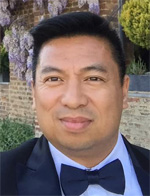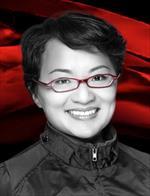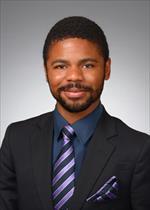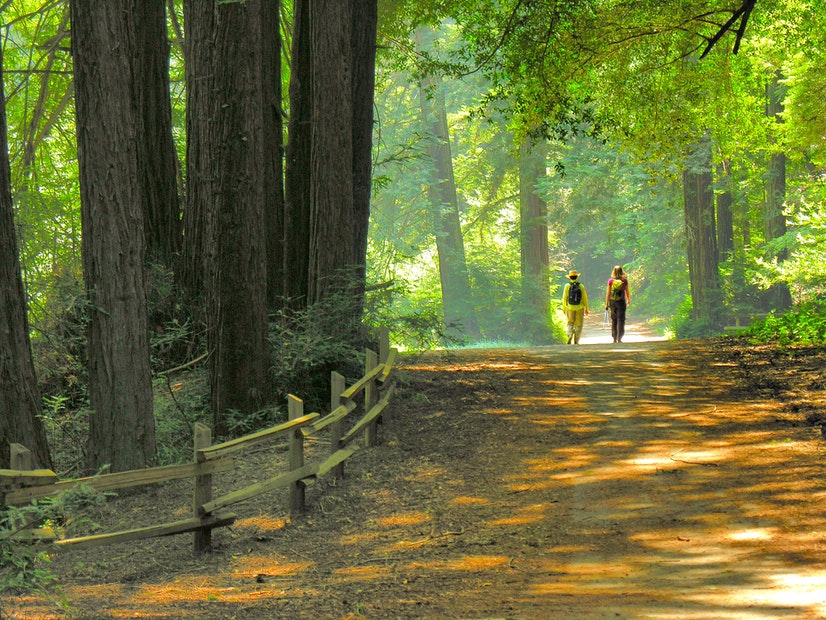Dear Expresso Readers,
A concise quote from South African artist and visual activist Zanele Muholi conveys the power of LGBTQ+ Pride: “If I wait for someone else to validate my existence, it will mean that I’m shortchanging myself.”
Pride – a celebration of people loving and accepting themselves and making no apologies for who they are, and allies supporting and standing up for them. A celebration of a vibrant community that seeks a life of visibility, dignity, and equality.
And yet, several recent items of troubling legislation across the country seek to restrict the rights of transgender and gender-expansive people. We must support the gender expression of transgender youth, provide access for all to facilities that fit one’s gender identity, and support businesses that provide services without discrimination to the LGBTQ+ community.
In this month’s installment of Expresso, I’m taking a different approach than in years past. Three members of the UCSF community generously agreed to share their perspectives on Pride. My gratitude to Henry Ocampo, Benioff Children’s Hospitals program manager for Diversity, Equity and Inclusion; Judy Tan, assistant professor in the Department of Medicine; and Chase Anderson, ACGME/ABMS Fellow in the Department of Psychiatry for sharing their unique experiences. I also thank Klint Jaramillo, director of the LGBT Resource Center in the Office of Diversity and Outreach, for his insight and year-round leadership.
This month we also celebrate Juneteenth, marking the 1865 emancipation of individuals enslaved in the U.S. However, we have just observed the centennial of the Tulsa Greenwood Massacre and the first anniversary of the killing of George Floyd. These are only two events of the countless within our history that are evidence of how much work our country still has ahead to abolish the institutional racism that has affected generation after generation of Black people and communities. As Coretta Scott King once said, “It doesn’t matter how strong your opinions are. If you don’t use your power for positive change, you are indeed, part of the problem.”
We all must fight for change…toward a life of visibility, dignity, and equality for all.
Have something in mind for a future issue of Expresso? Let me know at [email protected].
With best wishes for the summer,
Dan
My Authentic Self
Henry Ocampo, MPH
 My name is Henry Ocampo and I’m a gay Filipino. I’m the youngest of four children and immigrated to the U.S. when I was only two years old and pretty much grew up here in the Bay Area. Looking back, I always knew I was different, but I didn’t know what that meant. It wasn’t until my teenage years that I knew I was attracted to other guys, but that realization made me develop such an intense shame that I feared letting anyone know who I really was. I spent so much time and energy being the good student, the loyal friend, the dutiful son, being the person that I thought everyone wanted me to be, but just not the person that I really was.
My name is Henry Ocampo and I’m a gay Filipino. I’m the youngest of four children and immigrated to the U.S. when I was only two years old and pretty much grew up here in the Bay Area. Looking back, I always knew I was different, but I didn’t know what that meant. It wasn’t until my teenage years that I knew I was attracted to other guys, but that realization made me develop such an intense shame that I feared letting anyone know who I really was. I spent so much time and energy being the good student, the loyal friend, the dutiful son, being the person that I thought everyone wanted me to be, but just not the person that I really was.
It wasn’t until college when I started exploring on my own, reading books and pamphlets on coming out, meeting other gay college friends, and learning how to be comfortable with myself. But also, at that time, I started living a fractured life – one where I was gay and the other where I was Filipino. Different friends, different activities, different ways of being myself. Depending on who you were and how you came into my life, you only saw one part of who I really was.
This was reinforced when I finally told my parents. Their initial reaction was not about loving me or accepting me, but “What would our friends think about us?” It was about bringing shame to our family and trying to save face with how others will look at us. Don’t get me wrong, I know that my parents love me and support me in their own way. However, this cultural mentality of saving face was so strong that they were fine with me being gay, as long as I didn’t tell anyone.
I’ve worked hard to piece my fractured self together, to love and accept my authentic self. As the Program Manager on Diversity, Equity, Inclusion with the UCSF Benioff Children’s Hospital, I have the privilege of helping to create a work environment where all staff can be our authentic selves. It takes an amazing organization to create a culture where you don’t need to hide or lie about yourself but be the best of who you are.
To Have Pride
Judy Tan, PhD
 As Pride Month approaches, I think about what it means to have pride in being a queer Asian American cis woman, an intersection of identities that are particularly salient in the current time and place. Pride is an emotion, that feeling swelling up in your chest when you hear your national anthem, when your favorite sports team wins, or – if you’re like me – when you witness a woman of color take the oath to an office no one other than white men have held before. Feeling pride helps me feel less alone. Feeling pride helps me feel hopeful.
As Pride Month approaches, I think about what it means to have pride in being a queer Asian American cis woman, an intersection of identities that are particularly salient in the current time and place. Pride is an emotion, that feeling swelling up in your chest when you hear your national anthem, when your favorite sports team wins, or – if you’re like me – when you witness a woman of color take the oath to an office no one other than white men have held before. Feeling pride helps me feel less alone. Feeling pride helps me feel hopeful.
Pride is the antithesis of loneliness and social isolation. This is the basic premise of social behavioral research that suggests how fostering pride in being a part of a stigmatized group can help a person overcome feelings of shame and isolation. Pride is the antidote, the “social cure” to the negative impacts of stigmatization. This is the premise of my research to foster pride among older people with HIV who, because of aging and living with a stigmatizing condition, experience social isolation and loneliness. This research aims to foster pride by engaging older folks with HIV in group singing, a process through which individuals come together to co-create something new and beautiful and exciting and unique – something that cannot be achieved unless the group collaborates in redefining what it means to age with HIV.
An older person with HIV experiences the stigma of HIV differently than a younger person with HIV because in U.S. society, aging is socially devalued (i.e., associated with negative connotations). Understanding how the stigma of HIV interacts with the stigma of aging to impact the experience of an older person with HIV is at the heart of intersectionality. Developed by Kimberlé Crenshaw, the theory of intersectionality is used to understand how, for example, the experiences of a Black sexual minority cisgender woman are often the product of intersecting patterns of racism, homophobia, and sexism.
Nothing is as useful as a good theory, to paraphrase social psychologist Kurt Lewin. In practice, intersectionality means acknowledging our interconnectedness and interdependence. Your suffering is my suffering, and my oppression, yours. Intersectionality means that, as members of the LGBTQ community, we must fight against the oppression of and the injustice experienced by Black, Indigenous, and other communities of color. While social injustice may be experienced differently by sexual and gender minority folks, our fight must be the same. This is the definition of PRIDE.
Pride in a Pandemic: A Black, gay, child and adolescent psychiatry fellow reflects on what Pride means in 2021
Chase TM Anderson, MD, MS
 It’s June 2020, and hope spirals through my heart as I walk through the streets of the Castro. There’s a lightness to my whole body, a sense of magic realized as the rainbow flag that signals my new home waves gently with the breeze. My mask firmly in place – we’re in a pandemic after all – I stroll through the streets during midday, many of the shops boarded up. Even though a part of me wonders if they will ever open again, if there will be the hustle and bustle that I once heard was standard for this neighborhood, there’s still a sense of pride that permeates this place. From the rainbow-striped crosswalk to the Human Rights Campaign store to the multitude of gay couples that walk here openly holding hands, there’s something about the Castro, about San Francisco, that makes one feel safe being themselves.
It’s June 2020, and hope spirals through my heart as I walk through the streets of the Castro. There’s a lightness to my whole body, a sense of magic realized as the rainbow flag that signals my new home waves gently with the breeze. My mask firmly in place – we’re in a pandemic after all – I stroll through the streets during midday, many of the shops boarded up. Even though a part of me wonders if they will ever open again, if there will be the hustle and bustle that I once heard was standard for this neighborhood, there’s still a sense of pride that permeates this place. From the rainbow-striped crosswalk to the Human Rights Campaign store to the multitude of gay couples that walk here openly holding hands, there’s something about the Castro, about San Francisco, that makes one feel safe being themselves.
As a Black, gay, child and adolescent psychiatry fellow at UCSF, I moved to San Francisco in June of 2020. In the middle of a pandemic, I entered a new environment that I hoped would be better than my last. I came to begin my fellowship on the chance that I might have finally found a place in medicine that would accept me as I was, and not only accept me, but also support the person I was and who I wanted to become. You see, because of discriminatory events due to my race and sexual orientation over the last seven years of medical training, I was pretty sure by that point that no place was safe for minoritized people to exist as themselves. So, my most fervent wish that day in 2020 was that I’d finally found the right home.
One year later, San Francisco, UCSF, remain home to me.
My depression and suicidal ideation that had resurged in medical school and then again in residency because of discrimination is still in remission. My anxiety is far better. I feel safe to exist as myself here – a Black, gay, pink- and purple-haired child psychiatry fellow whom friends call a unicorn-phoenix. I am supported by program leadership, my attendings, in a way that I didn’t know was possible in medicine. I am fostered in my writing op-eds and giving talks about minority stress. I work with co-fellows who continually inspire me, where we continually have those vital discussions around women’s rights, misogyny, racism, transphobia, etc. I get to be a Black, gay, child and adolescent psychiatrist who is with children and their families in their hardest moments, and my identity is seen as a strength, not a detriment. I can finally be that person I was in college and graduate school, where being Black and gay are only pieces of who I am overall.
And that continually fills me with such pride.
However, that doesn’t mean all is right in our world. There are anti-transgender bills passing legislation across the country without enough people, universities, and corporations speaking out. Gay marriage, which we only got in 2015 after herculean efforts by so many generations, is under attack. There is a global pandemic that was entirely mismanaged by our previous administration to the detriment of all. The genocide of Palestinians and antisemitism continue. Voting restriction bills are rampant in America. Hate crimes against Asian Americans have skyrocketed. What does that mean for our society as we move forward?
It means we continue to use our voices as physicians, as people with privilege and leverage. It means we find our own unique ways of advocating for the best in ourselves and others. With regards to UCSF, it means that we continue to think about how to improve ourselves as an institution – how do we truly support trainees and their mental health, how do we advocate as an institution for a better world, how do we engage in the necessary conversations around discrimination and protecting those who are taking on said forces? In terms of our world, America, it means that we let our pride in who we could be as a society take hold and drive us towards that future we can and will reach – one where we are genuinely united.
As a unicorn-phoenix who lives at the intersection of being Black, gay, and so many other facets, as I reflect on 2021 Pride coming this year, Pride will always mean so much more than simply one month to me. It is a way of living where we show up with our patients and others as our authentic selves. It means we battle for those who have been silenced to create space for them to have their voices. It means we revel in our joys and successes. It means unity. It means living day in and day out in a way where we are unabashedly and amazingly our best selves.
Of course, it also means one day dancing in the streets of the Castro with my LGBTQ+ family without a mask as the music reverberates through all of us. But until that day comes, and after that day comes, we will continue to live with pride in ourselves and who we can become.
And I wouldn’t have it any other way.
Dan’s Tip of the Month
 As COVID-19 restrictions lift and the CDC says that those who are vaccinated may forgo wearing masks outside, I for one am itching to stretch my limbs and actually feel the sun and breeze on my face once again. Fortunately, outdoor recreation is part of California’s DNA, so I would like to suggest a few of my favorite local walking and hiking spots, as well as a couple from the EVCP team. Starting in San Francisco – Lands End. Heading north to Marin – Tennessee Valley Trail at dusk. Moving east into Oakland – Huckleberry Botanic Regional Preserve. Finally, going south – the many options available within the Peninsula Open Space Trust, and for the more adventurous, going even farther south – Point Lobos State Natural Reserve (get there early to find parking!). Each is spectacular and waiting to refresh us all.
As COVID-19 restrictions lift and the CDC says that those who are vaccinated may forgo wearing masks outside, I for one am itching to stretch my limbs and actually feel the sun and breeze on my face once again. Fortunately, outdoor recreation is part of California’s DNA, so I would like to suggest a few of my favorite local walking and hiking spots, as well as a couple from the EVCP team. Starting in San Francisco – Lands End. Heading north to Marin – Tennessee Valley Trail at dusk. Moving east into Oakland – Huckleberry Botanic Regional Preserve. Finally, going south – the many options available within the Peninsula Open Space Trust, and for the more adventurous, going even farther south – Point Lobos State Natural Reserve (get there early to find parking!). Each is spectacular and waiting to refresh us all.